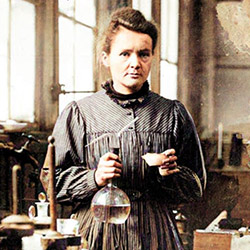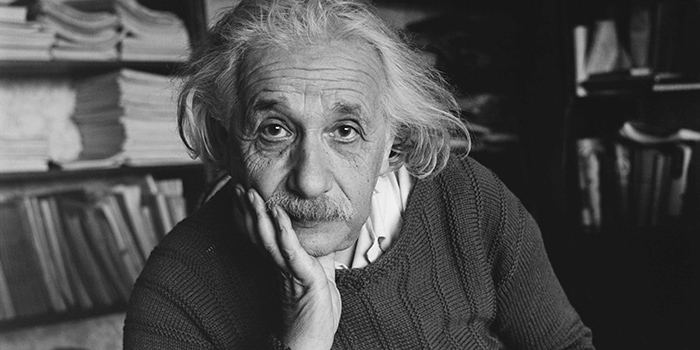Quiz Topic Sheet
Great Names in Science
The evolution of science is a continuous and dynamic process, shaped by the remarkable contributions of certain brilliant minds throughout history. These great names in science have pushed back the frontiers of knowledge, revolutionizing our perceptions of the world and paving the way for major advances in a multitude of fields.
Advertisement
Ancient times
- Democritus (5th century BC): Developed the theory that matter is composed of indivisible atoms.
- Aristotle (4th century BC): Universal mind who assimilated all the knowledge of his time in every field. His thought and philosophy influenced the West for almost 2,000 years. Aristotle (4th century BC): Observations and classifications of animals and plants.
- Hippocrates (4th century BC): First to dissociate medicine from magic and religion. Author of the "Oath" on medical practice.
- Archimedes (3rd century BC): Explained the principle of the lever and created inventions such as the endless screw, the pulley and the cogwheel.
- Aristarchus of Samos (3rd century BC): First to suggest that the Earth revolves around the Sun and rotates on itself.
- Euclid (circa 300 BC): Greek mathematician considered the father of geometry. His "Elements" constituted the fundamental basis of geometry, and served as a reference for centuries.
- Claudius Ptolemy (2nd century): Promoted a geocentric planetary system that remained in force for 1300 years. His treatise on astronomy, the "Almageste", served as a reference for thirteen centuries.
Middle Ages
- Alhazen (10th century): Optics and invention of the darkroom.
- Ibn al-Baitar (13th century): Botany and pharmacology.
- Fibonacci (13th century): Fibonacci sequence.
Renaissance
- Copernicus (1543): Proposes a heliocentric world system.
- Andreas Vesalius (16th century): Human anatomy and refutation of Galen's errors.
17th century
- Galileo: Creates the first telescope and discovers the satellites of Jupiter and the rings of Saturn. Confirms Copernicus' heliocentric theory.
- Johannes Kepler: discovers that the planets revolve around the Sun in elliptical orbits.
- Isaac Newton: revolutionizes physics with his discovery of the law of universal gravitation and develops infinitesimal calculus.
- Gottfried Wilhelm Leibniz: Infinitesimal calculus.
- Evangelista Torricelli: Invented the mercury barometer and proved the existence of atmospheric pressure.
- Robert Hooke: Discovery of cells through the microscope.
- Antonie Van Leeuwenhoek: Invention of the microscope and observations of microorganisms, refuting the theory of spontaneous generation.
- René Descartes: Analytical geometry.
18th century
- James Watt: Improvement of the steam engine.
- Edward Jenner: Vaccination against smallpox.
- Benjamin Franklin: Demonstrates the electrical nature of lightning.
- Antoine de Lavoisier: Laid the foundations of modern chemistry by applying the scientific method to this science. Discovered the role of oxygen in respiration and combustion.
- Alessandro Volta: Invented the electric battery and gave his name to the unit of electrical voltage.
- Carl von Linné: Classification system for living organisms.
- Joseph Priestley: Discovery of oxygen.
- Edward Jenner: Smallpox vaccination.
- Adam Smith: Economics and market theory.
19th century
- Michael Faraday: discovers electromagnetic induction, the basis of the generator, transformer and electric motor.
- James Clerk Maxwell: Unified electricity and magnetism and asserted that light is an electromagnetic wave.
- Louis Pasteur: Develops vaccine preparation techniques and discovers pasteurization.
- Gregor Mendel: Announced the laws of heredity after studying 300,000 pea seeds.
- Charles Darwin: Publishes "The Origin of Species" and explains the evolution of living species through natural selection.
- John Dalton: Atomic theory of matter.
- Dmitri Mendeleïev: Periodic table of the elements.
- Joseph Lister: Antisepsis and aseptic surgery.
- Samuel Morse: Telegraph communication.
- Alexander Graham Bell: Telephone.
- Thomas Edison: Applications of electricity.
20th century
- Marie Curie: Discovers polonium and radium and wins two Nobel Prizes for her research into radioactivity.
- Albert Einstein: He developed the theory of relativity and revolutionized our understanding of space, time and gravity, as well as making major contributions to quantum physics, including the theory of photoelectricity.
- Max Planck: Planck laid the foundations of quantum theory with his proposal for the quantization of energy, which led to the formulation of quantum theory.
- Niels Bohr: He developed Bohr's atomic model by integrating Planck's quantization principles into atomic theory, thus laying the foundations of quantum mechanics.
- Werner Heisenberg: Heisenberg formulated the uncertainty principle, which establishes a fundamental limit to the precision with which a particle's position and velocity can be measured simultaneously, and contributed to the formulation of quantum mechanics.
- Erwin Schrödinger : He developed the Schrödinger wave equation, a fundamental equation of quantum mechanics that describes the time evolution of quantum systems.
- Paul Dirac: Dirac formulated the Dirac equation, which describes the behavior of relativistic spin-1/2 particles and laid the foundations of quantum field theory.
- Louis de Broglie: De Broglie proposed the theory of wave-particle duality, suggesting that material particles, such as electrons, can also exhibit wave-like properties.
- Wolfgang Pauli: Pauli formulated the Pauli exclusion principle, which states that no two electrons in an atom can have the same four quantum numbers, thus laying the foundations for the structure of the periodic table and the theory of atomic orbitals.
- Max Born: Contributed to the probabilistic interpretation of quantum mechanics, suggesting that the wave function describes the probability of finding a particle in a certain position.
- John von Neumann: Developed the rigorous mathematical formulation of quantum mechanics, laying the foundations for modern understanding of quantum theory.
- Alexander Fleming: Discovered penicillin, the first antibiotic.
- Edwin Hubble: Discovered the expansion of the universe.
- James Watson and Francis Crick: Determined the double-helix structure of DNA, the molecule that carries heredity.
- Linus Pauling: Determined the structure of numerous molecules, including vitamin C and hemoglobin.
- Wernher von Braun: One of the key figures in space exploration.
- Stephen Hawking: Theoretical physicist who has made major contributions to the understanding of black holes and the universe.
- Irving Langmuir: Surface chemistry and chemical bonding theory.
- Alfred Wegener: Theory of continental drift.
- Alan Turing: Turing machine, theoretical computer science.
- John von Neumann: Zero-sum games and game theory.
- Sigmund Freud: Psychoanalysis.
- Noam Chomsky: Linguistics and the theory of universal grammar.
- Jean Piaget: Cognitive development psychology.
- Guglielmo Marconi: He was the first to successfully transmit radio signals over long distances without the use of wires.
- John Logie Baird: Development of the first television.
- Vinton Cerf and Bob Kahn: developed the TCP/IP protocol, the basis of the modern Internet.
- Maarten Schmidt: discovery of quasars.
- Martin Cooper: inventor of the cell phone.
- Georges Lemaître: first proposed the idea of the universe expanding from an initial hot, dense state, which he called the "primitive atom" (Big Bang theory).
- Frederick Banting and Charles Best: discovery of insulin.
- Richard Feynman : often cited for anticipating the development of nanotechnology.
- Tim Berners-Lee: recognized as the inventor of the World Wide Web (WWW).
- Michel Mayor and Didier Queloz: discovered the first exoplanet to orbit a star.
- Frank Drake: pioneer in the search for extraterrestrial life.
- Rita Levi-Montalcini: pioneering neurologist whose research into nerve growth factors opened up new avenues in the understanding of neuronal development and neurological diseases.
21st century
- Craig Venter: Sequences the human genome for the first time.
- Herbert Boyer and Stanley Cohen: development of modern biotechnology with their invention of the recombinant DNA technique.
- Paul Anastas and John Warner: recognized as the fathers of green chemistry for their development of the principles of green chemistry.
- Jennifer Doudna and Emmanuelle Charpentier: their work on CRISPR-Cas9 technology revolutionized gene therapy and paved the way for personalized medicine.
- Steve Jobs and Apple: played a major role in the popularization and development of smartphones.
- Mark Zuckerberg: the founder of Facebook helped popularize social networking worldwide.
- Rodney Brooks: robotics pioneer, known for his work on autonomous mobile robots and co-founding of iRobot Corporation, the company behind the famous Roomba.
- James Hansen: renowned climatologist who contributed to the development of climate models.
- John McCarthy: credited with coining the term "artificial intelligence" and pioneering the field.
- Geoffrey Hinton, Yann LeCun and Yoshua Bengio: often referred to as the "fathers" of deep learning, a branch of artificial intelligence that has led to significant advances in Big Data processing and machine learning.
- Peter Shor: quantum computer scientist famous for his factoring algorithm, which demonstrated the advantage of quantum computing over classical computing.
Further Information
Advertisement
Quiz questions preview
-
He helped found the modern probability theory and invented the first calculating machine at the age of 19.
Christian Huygens | Gottfried Wilhelm Leibniz | Blaise Pascal | Pierre-Simon de Laplace -
This Greek mathematician from Alexandria lived around 300 BC is considered the father of geometry.
Pythagoras | Euclid | Hipparchus | Thales -
This American biologist developed the first oral contraceptive, the contraceptive pill, marketed in 1960.
Carl Djerassi | Gregory Pincus | George Rosenkranz | Russell Marker -
He invented the Web in 1991 when he created a server using hyperlinks and a browser that could read them.
Tim Berners-Lee | Linus Torvalds | Bill Gates | Marc Andreessen -
Inventor of the mercury thermometer, he added it a graduation scale in order to accurately assess the temperature.
Anders Celsius | René Antoine de Réaumur | Daniel Fahrenheit | Christiaan Huygens


